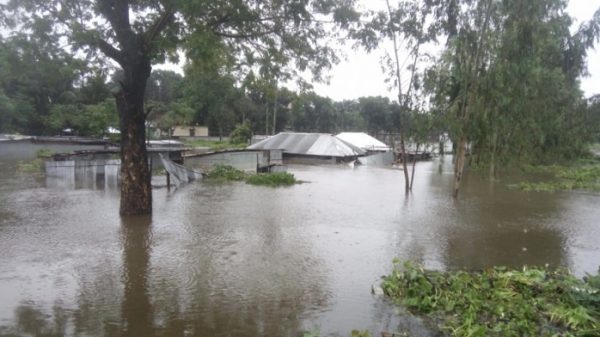High unemployment and COVID-19 hampering monsoon readiness in Bangladesh

- Update Time : Monday, July 13, 2020
- 184 Time View

As Bangladesh prepares to be battered by heavy rain, new researchfinds high unemployment and Coronavirushave hit flood and landslide preparations.
Flood preparation specialists have discovered that a loss of incomecaused byCoronaviruswill make it harder for vulnerable communities to prepare for floods and landslides this monsoon season.
New research found that 72 per cent ofthe population surveyed in Bangladesh were unemployed due to movement restrictions and workplace closures.
Daily wage workers, such as rickshaw and transport drivers, masons, garment workers, small scale traders and farmershave been especially impacted. These groups accounted for nearly half of the surveyed population.
Afsari Begum, from Practical Action in Bangladeshhas warned that flood and landslides from this year’s monsoon season will impact communities more severely because of economic stagnation and Coronavirus health risks, even though there are proven, affordable solutions already available.
The warning comes as Bangladesh braces itself for extremely heavy rain, amid fears that low-lying areas in 23 districts are predicted to experience a month-long fresh flooding in the next week with the rise of water levels in major rivers due to onrush of upstream waters coupled with heavy to very heavy downpours.
The report, commissioned by the Zurich Flood Resilience Alliance, and titled “Monsoon, floods and COVID-19: building community resilience in Bangladesh”, surveyed 15 Union Disaster Management Committees(UMDC) across threedistricts, home to 380,000 people.
Afsari Begum, Senior Specialist for Disaster Risk Reduction, from Practical Action in Bangladesh co-authored the report and said“We’re concerned that a lot of people will be pushed further into poverty because of Coronavirus. If communities are battered by intense storms and floods that destroy or damage homes, agricultural land, schools and hospitals, it will only make things worse.”
“What is frustrating is that Practical Action already has proven solutions to these problems. We just need additional investment to bring them to scale so that climate change and monsoons don’t add further shocks to the economic problems people are facing. Unless the funds are put in the right place, this could tip many people over the edge and the effects on vulnerable communities will be catastrophic.”She added
The survey was conducted to understand their readiness for the monsoon rains and flooding season, amid the Coronavirus health crisis.The report found:
• 72% of the population is unemployed due to movement restrictions and workplace closures;
• A lack of income, increase in prices of goodsand market closures are leading to challenges to purchase food and essential items for hygiene and sanitation maintenance such as hand soap;
• Cultivation of agriculture products is difficult due to lack of seeds, fertilizers, and pesticides in the market;
• Concerns of the monsoon induced floods exacerbating socio-economic and health conditions of vulnerable groups and pushing people into poverty;
• Nearly 90% of people are not fully aware of proper hygiene and sanitation practices to prevent Coronavirus transmission, especially during flood events;
• Not having quarantine facilities, with home isolation the only available option;
• Three quarters of management committees not fully functional, mainly due to lack of resource and budget;
• Most committees have not been able to consider Coronavirus in disaster management plans due to lack of knowledge and guidance.
The report’s co-author, ZakiaNaznin, Programme Manager, Flood Resilience Project, Char Programme, from Concern Worldwide said “While it is not possible to prevent floods and storms, it is possible to limit the damage they cause to vulnerable communities, to help prevent loss of life and livelihoods, damage to property and essential services such as hospitals and schools.”
While discussing about this new report, Subinoy Dutta, Program and Advocacy Manager, Zurich Flood Resilience Alliance, Mercy Corps in Bangladesh said“Bangladesh is a country that is very vulnerable to hazards like storms and flood impacts, which are exacerbated by climate change shocks like rising sea levels. Now, at the start of this monsoon season, it has to grapple with the Coronavirus crisis. Our research shows that a lot of people, especially the poor, are unable to earn income in sectors that require them to leave the house to make a living. For them, there is no work from home option.”



















